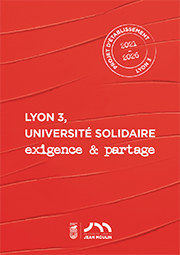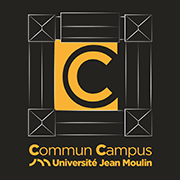AccueilRechercheLes productions scientifiquesThèsesThèses soutenuesThèses soutenues - 2006-2020Thèses soutenues - 2017
-
Partager cette page
- Recherche,
PIRO Vincenzo
Entre phénoménologie et apophatisme : à partir de Jean-Luc Marion
Publié le 21 décembre 2017 – Mis à jour le 22 février 2018
Thèse en cotutelle en Philosophie – Étude des Systèmes, soutenue le 20 décembre 2017.
« Poète et non honnête homme. On ne consulte que l’oreille, parce qu’on manque de cœur » : il y a peut-être une très grande proximité entre cette pensée de Pascal et l’inspiration de la pensée de Marion. Dans l’article « De la “mort de Dieu” aux noms divins » il fait allusion à une logique de la charité à développer, comme tache pour la pensée. Ce qu’on a tenté de reconstruire, c’est le développement de cette inspiration, en ayant comme point de départ le concept de négation, tel qu’il émerge dans Certitudes négatives. La négation constitue dans ce texte, par le concept de certitude négative, un troisième élargissement de la phénoménalité, qui saisit non seulement l’excès de l’intuition par rapport aux concepts, mais l’impossibilité que l’excès impose aux concepts. Marion présente un discours sur la limite, transcendantale, à entendre comme le lieu où se donne un degré redoublé de réalité. Cette avancée, qui montre qu’aussi la négation relève de la donation, doit être mise en perspective avec le constat, qui caractérise la fin de Reduction et donation, que la négation, par l’ennui, est la condition pour accéder à la donation. On a essayé d’approfondir ce nœud par la reconstruction de l’émergence de la négation dans la pensée de Marion et de ses caractères, avec une particulière attention au concept de distance et à sa genèse. Par cette voie on a pu mettre en évidence l’articulation concrète et la centralité dans l’œuvre de Marion du rapport entre phénoménologie et apophatisme, et la façon avec laquelle elle peut se développer en une logique de la charité.
« Poet and not honest man. We consult only the ear, because we lack heart ». There is perhaps a great proximity between this thought of Pascal and the inspiration of Marion's thought. In the article « De la “mort de dieu” aux noms divins » he alludes to a logic of charity to develop, as a task for thought. What we have tried to reconstruct is the development of this inspiration, having as a starting point the concept of negation, as it emerges in certain Certitudes négatives. Negation constitutes in this text, by the concept of negative certainty, a third enlargement of phenomenality - after the givenness and saturated phenomena - which captures not only the excess of intuition in relation to concepts, but the impossibility that excess imposes on concepts. Marion presents a discourse on the transcendental limit, to be understood as the place where a redoubled degree of reality is given. This advance, which shows that the negation belongs to the givenness, must be put into perspective with the finding, which characterizes the end of Reduction and givenness, that negation, through boredom, is the condition for accessing the donation. We tried to analyze this crux by reconstructing the emergence of negation in Marion's thought and its characters, with particular attention to the concept of distance and its genesis. In this way it has been possible to highlight the concrete articulation and centrality in Marion's work of the relationship between phenomenology and apophatism, and the way in which it can develop into a logic of charity.
Mots-clés : Phénoménologie, Distance, Apophatism, Jean-Luc Marion, Limite, Donation
Keywords : Phenomenology, Distance, Apophatism, Jean-Luc Marion, Limit, Givenness
Directeur(s).trice(s) de thèse : M. Bruno PINCHARD et M. Silvano ZUCAL
Membres du jury :
M. Salvatore ABBRUZZESE, Professore ordinario, Università degli Studi di Trento (Italie),
Mme Carla CANULLO, Rapporteur, Professore associato, Università di Macerata (Italie),
M. Jean-Luc MARION, Professeur des universités émérite, Université Paris-Sorbonne,
M. Marco MOSCHINI, Professore associato, Università degli Studi di Perugia (Italie),
M. Jean-Philippe PIERRON, Professeur des universités, Université Jean Moulin Lyon 3,
M. Bruno PINCHARD, Professeur des universités, Université Jean Moulin Lyon 3,
Mme Émilie TARDIVEL, Maître de conférences, Institut Catholique de Paris,
M. Silvano ZUCAL, Professore associato, Università degli Studi di Trento (Italie).
Président.e du jury : Mme Carla CANULLO
Equipe d'accueil : IRPHIL
Décision : Admis
« Poet and not honest man. We consult only the ear, because we lack heart ». There is perhaps a great proximity between this thought of Pascal and the inspiration of Marion's thought. In the article « De la “mort de dieu” aux noms divins » he alludes to a logic of charity to develop, as a task for thought. What we have tried to reconstruct is the development of this inspiration, having as a starting point the concept of negation, as it emerges in certain Certitudes négatives. Negation constitutes in this text, by the concept of negative certainty, a third enlargement of phenomenality - after the givenness and saturated phenomena - which captures not only the excess of intuition in relation to concepts, but the impossibility that excess imposes on concepts. Marion presents a discourse on the transcendental limit, to be understood as the place where a redoubled degree of reality is given. This advance, which shows that the negation belongs to the givenness, must be put into perspective with the finding, which characterizes the end of Reduction and givenness, that negation, through boredom, is the condition for accessing the donation. We tried to analyze this crux by reconstructing the emergence of negation in Marion's thought and its characters, with particular attention to the concept of distance and its genesis. In this way it has been possible to highlight the concrete articulation and centrality in Marion's work of the relationship between phenomenology and apophatism, and the way in which it can develop into a logic of charity.
Mots-clés : Phénoménologie, Distance, Apophatism, Jean-Luc Marion, Limite, Donation
Keywords : Phenomenology, Distance, Apophatism, Jean-Luc Marion, Limit, Givenness
Directeur(s).trice(s) de thèse : M. Bruno PINCHARD et M. Silvano ZUCAL
Membres du jury :
M. Salvatore ABBRUZZESE, Professore ordinario, Università degli Studi di Trento (Italie),
Mme Carla CANULLO, Rapporteur, Professore associato, Università di Macerata (Italie),
M. Jean-Luc MARION, Professeur des universités émérite, Université Paris-Sorbonne,
M. Marco MOSCHINI, Professore associato, Università degli Studi di Perugia (Italie),
M. Jean-Philippe PIERRON, Professeur des universités, Université Jean Moulin Lyon 3,
M. Bruno PINCHARD, Professeur des universités, Université Jean Moulin Lyon 3,
Mme Émilie TARDIVEL, Maître de conférences, Institut Catholique de Paris,
M. Silvano ZUCAL, Professore associato, Università degli Studi di Trento (Italie).
Président.e du jury : Mme Carla CANULLO
Equipe d'accueil : IRPHIL
Décision : Admis
Documentation
Mise à jour : 22 février 2018



